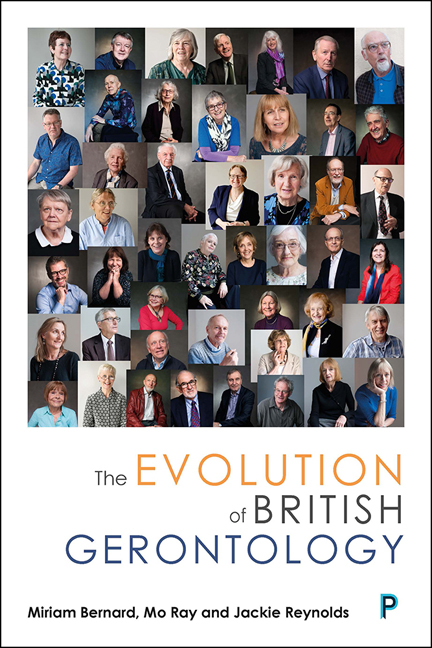Book contents
- Frontmatter
- Dedication
- Contents
- Acknowledgements
- PART I The Ageing of British Gerontology
- PART II Learning from the Past
- PART III Lives and Careers in Gerontology
- PART IV Informing the Future
- Appendix 1: Timeline: Policies, Research Programmes, Organisations and key Events
- Appendix 2: Conference themes, sub-themes and Selected Topics, 1971– 2018
- Bibliography
- Index
2 - British Gerontologists: Who’s Who
Published online by Cambridge University Press: 25 February 2021
- Frontmatter
- Dedication
- Contents
- Acknowledgements
- PART I The Ageing of British Gerontology
- PART II Learning from the Past
- PART III Lives and Careers in Gerontology
- PART IV Informing the Future
- Appendix 1: Timeline: Policies, Research Programmes, Organisations and key Events
- Appendix 2: Conference themes, sub-themes and Selected Topics, 1971– 2018
- Bibliography
- Index
Summary
Introduction
Having briefly described in Chapter 1 how the 50 gerontologists came to participate in the project, as well as some of the threads that connect them, this chapter presents a series of individual pen portraits. These portraits are not, in any sense, meant to be formal biographies or CVs, or the kind of profile that might appear on institutional web pages. Instead, the aim is to provide readers with more of an insight into who these 50 British gerontologists are than might be gleaned simply from using selected quotations from their interviews to illustrate the themes and issues discussed in subsequent chapters. In this sense, the portraits are the individual and personal contexts for what follows. Up to three references at the end of each portrait are also included to enable readers to follow up work that participants are known for. These publications and resources were sometimes mentioned in interview as things of which people are proud, or feel are important. Others were sent subsequently in response to a request for such information, or have been added by us as authors.
While everyone who participated in the project is well versed in critiquing the nature of ageing and old age, we were keen to encourage these ageing gerontologists to reflect a little on their own ageing as well as on their own work. Indeed, if professional gerontologists are unable to identify with becoming and being old (Bytheway et al, 1989), what hope is there for changing attitudes and furthering understanding more broadly? Moreover, by accompanying the written portraits with professional photographs, we have taken to heart calls from prominent international colleagues to put a ‘human face’ not just on critical gerontology (Moody, 1992; Holstein and Minkler, 2007; Ray, 2008) but now, literally, on gerontologists themselves.
Sara Arber
Sara is Professor of Sociology at the University of Surrey and describes herself as transitioning to retirement having been working part-time for the past four years. A sociologist by background, with a Master's in medical sociology from Bedford College, London and research methods and quantitative analysis skills acquired at the University of Michigan, Sara first got a lectureship at Surrey in 1974, “at the grand age of 25”.
- Type
- Chapter
- Information
- The Evolution of British GerontologyPersonal Perspectives and Historical Developments, pp. 21 - 92Publisher: Bristol University PressPrint publication year: 2020



